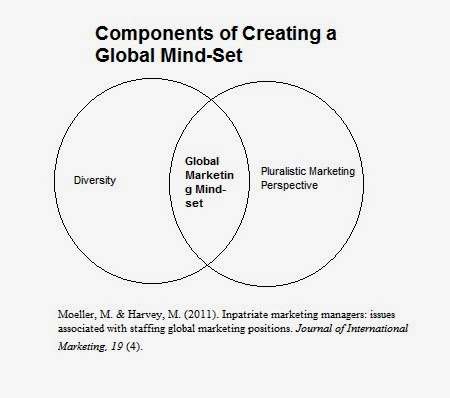Global marketing is a new business necessity as
global integration leaves few localities untouched by outside market influence.
Developing global managers and moving them into organizations where they are
most useful can help in the development of stronger marketing decisions.
Research by Moeller and Harvey (2011) highlight the need to develop the “global
mindset” among managers and use that mindset to compete on international
markets.
Before discussing the benefits of globally oriented
managers it is first beneficial to understand what the “global mindset” is.
According to Rhinesmith, the global mindset is, “the ability to scan the world from a broad perspective always looking
for unexpected trends and opportunities that may constitute a threat or an
opportunity to achieve personal, professional or organizational objectives”
(1993, p. 24). They are able to overview the global environment and understand
larger trends and move to specific knowledge adaptation when necessary.
Those with “global mindsets” do something a little differently
than local managers. They use something called the reference point theory.
Similar to the process of socialization, acknowledging and understanding
reference points, those with the global mindset can use multiple strategic
reference points when transitioning into culturally, economically, and
politically foreign environments (Fiegenbaum, et. al. 1996). In other words,
they have gained enough knowledge in their lives to bounce around different
cognitive models to see problems from varying cultural perspectives.
The ability to scan wide swaths of information, dig
deeply into areas of interest, and use multiple perspectives to solve problems
obviously has advantages for organizations that must market, distribute, and
operate on multiple continents. According to Gupta and Govindarajan (2004), it
provides organizations with the benefits to forecast trends in the market, gain
sophistication in analysis due to diversity of perspective, integrate best
practice knowledge, and coordinate across functional activities and borders.
The global mindset is developed through experiencing
other cultures and gaining of environmental knowledge. This comes from studying
concepts, understanding others points of view, being aware of your
surroundings, and being creative in problem solving. Some personalities strive
for understanding greater breadth of information while others do not. When
managers have gained cultural experience and knowledge they can put that to strong
use in solving complex global problems in logistics, marketing, human resource
management, and many other areas.
Fiegenbaum, A. et. al. (1996). “Strategic
Reference Point Theory,” Strategic Management Journal, 17 (3), 219–35.
Gupta, A. & Govindarajan, V.
(1991). Global Marketing Strategy and Organization. Hoboken, NJ: John
Wiley & Sons.
Moeller, M. & Harvey, M. (2011).
Inpatriate marketing managers: issues associated with staffing global marketing
positions. Journal of International
Marketing, 19 (4).
Rhinesmith, S. (1993). A Manager’s Guide to Globalization. Alexandria,
VA: Richard D. Irwin.

No comments:
Post a Comment